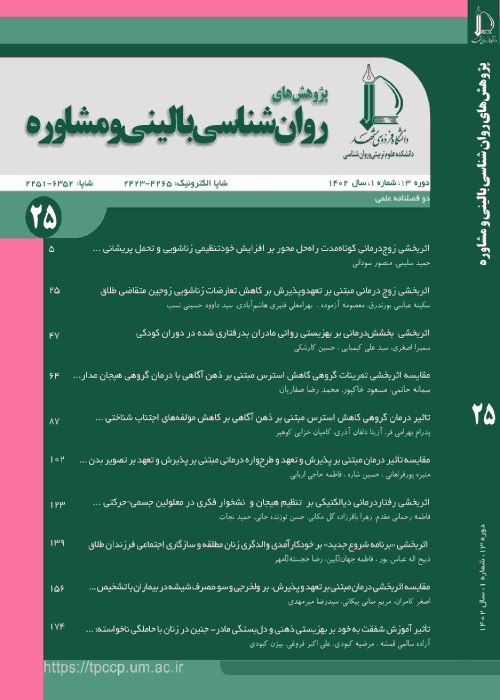Comparing the Effectiveness of Mindfulness-Based Stress Reduction Group Exercises and Emotion-Focused Group Therapy on Psychological Well-Being of Hospitalized Patients Recovered from Covid-19
The outbreak of Covid-19 and prevalence of death all over the world not only affects the physical health, but also the mental health of people. People experience various mental problems such as depression, anxiety, and stress. The negative impact of the virus on humans is so great that some scholars see it impossible to estimate the psychological impact of Covid-19 on people (Burke & Arslan, 2020). Therefore, the way dealing with the consequences of the virus is difficult (Xiang et al., 2020). Examining people’s psychological characteristics may be helpful for understanding the impact of preventive behaviors on psychological health, especially in patients who recovered from Covid-19. According to Arslan (2016), considering psychological well-being of these patients and the the factors affecting it can lead to improving their psychological health, especially those who have recovered from the illness. In this regard, Armour et al. (2021) reports the decrease of psychological well-being of patients with Covid-19. According to Dubey et al. (2020), one of the most widely used treatments during Covid-19 pandemic for reducing stress and improving positive psychological characteristics is mindfulness-based stress reduction group exercises. The exercise helps patients concentrate on correct and preventive behaviors without being worried about re-infection (Saricali et al., 2022). Emotion-focused group therapy is also one of the most effective treatments for people who have recovered from Covid-19 (Koren et al., 2021). Based on this method, the therapist encourages patients to use strategies that enhance thier awareness, acceptance, expression, regulation, and change of emotions. The aim of this inetervention is strengthening effective self-regulation and making a new meaning for life (Beasley & Ager, 2019). Emotion-focused group therapy may reduce stress and improve emotional control in people who recovered from Covid-19. Thompson-de Benoit and Kramer (2021) approved the impact of emotional therapy on psychotherapy in the time of Covid-19. However, few research has focused on the effectiveness of interventions that may improve psychological well-being of critically ill patients who have recovered from Covid-19. Since the virus has adverse impacts on the psychological well-being of critically ill patients who recover from Covid-19, such a study seems to be necessary. This study aims to compare the impacts of mindfulness-based stress reduction group exercises with the impacts of emotion-focused group therapy on psychological well-being of hospitalized and recovered patients from Covid-19.
The semi-experimental research included pre-test, post-test, and follow-up stages. The statistical population included all patients who were admitted to Imam Reza Hospital in Mashhad in between June and August 2021 for being infected with Covid-19, recovered, and discharged. The sample included 45 patients (15 patients for each group), who were selected using convenience sampling method and randomly divided into three groups. The first experimental group received eight 45-minute sessions of emotion-focused group therapy, the second experimental group received eight 120-minute sessions of mindfulness-based stress reduction group therapy, and the control group did not receive any intervention. For all the groups, a pre-test, a post-test, and a follow-up test two months after the end of the treatmen were conducted. The short version of Ryff’s psychological well-being scale was used for collecting data.
The results of mixed model for repeated measures showed that both mindfulness-based stress reduction exercises and emotion-focused group therapy have an impact on psychological well-being and its components in pre-test, post-test, and follow-up stages, as they improved the psychological well-being of the patients. Bonferroni test, however, showed that the treatments differ only in the purposefulness component, since the average score of purposefulness in the group treated with emotion-focused group therapy is significantly higher than the average score of purposefulness in group treated with mindfulness-based stress reduction group exercises.
Mindfulness-based exercises activate patients’ parasympathetic system, create a sense of relaxation, and reduce stress in body’s defense system. Moreover, created mental peace allows the recovered people to concentrate on preventive behaviors without being worried about the possibility of re-infection (Saricali et al., 2022). Arguably, through making people clearly aware of the current experiences as well as through experiencing and allowing all thoughts and feelings without judging, avoiding, or suppressing them (Bishop, 2004), mindfulness prevents people from being obsessively attracted to negative feelings and emotions and suppressing them. Instead, it makes patients accept the emotions. Mindfulness exercises help the patient become totally aware of his thoughts, feelings, and physical states at all moments and see calmly what is happening in the surrounding environment. Moreover, mindfulness exercises help the patient avoid drowning in his negative feelings and emotions, caused by acute illness in the past, and stop thinking and predicting about becoming sick again in the future. The results also showed that emotion-focused group therapy impacts on the psychological well-being. During the theraputic sessions, patients speak about their feelings and emotions and experience new emotions. Patients are helped to identify, experience, discover, change, and manage their emotions in a better way.
- حق عضویت دریافتی صرف حمایت از نشریات عضو و نگهداری، تکمیل و توسعه مگیران میشود.
- پرداخت حق اشتراک و دانلود مقالات اجازه بازنشر آن در سایر رسانههای چاپی و دیجیتال را به کاربر نمیدهد.


